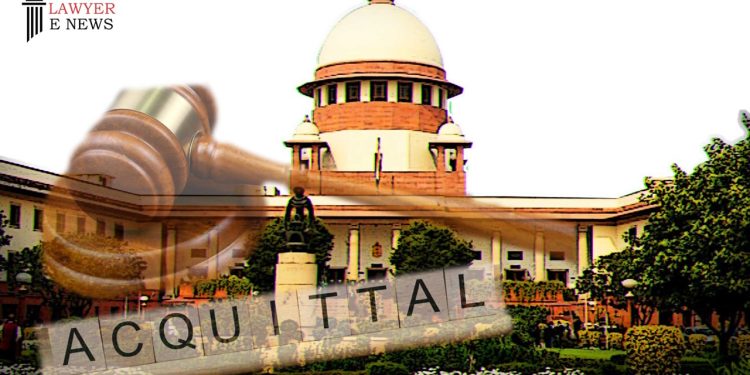Suspicion Can’t Replace Proof Beyond Reasonable Doubt in Criminal Cases – Supreme Court

The Supreme Court of India has recently passed a judgment in the case of Nikhil Chandra Mondal v. State of West Bengal (D.D. 03 March 2023), in which it has been held that if two reasonable conclusions are possible on the basis of the evidence on record, the Appellate Court should not disturb the finding of acquittal recorded by the trial court. The view taken by the trial court was well-reasoned and not perverse or illegal/impossible to warrant interference, and therefore the High Court erred in interfering with the acquittal. Suspicion Can’t Replace Proof Beyond Reasonable Doubt in Criminal Cases.
Facts
The case involves the murder of a married woman whose body was found near Ambalgisan Railway Station in March 1983. The appellant, accompanied by his wife (the deceased) and their son, had gone to attend the Fullara Mela organized in Lavpur Gram Panchayat, and the deceased went missing from there.
After investigating the matter, the police charged the appellant under Section 302 of the IPC for the murder of his wife. During the investigation, the appellant confessed to three individuals that he had murdered his wife with a bhojali (the murder weapon) at the spot where the body was found. However, the trial court acquitted the appellant due to inconsistencies in the testimonies of the witnesses.
The State appealed against the acquittal, and the High Court convicted the appellant based on the extra-judicial confession made before the witnesses. The present appeal is against the High Court’s judgment and order.
Observed and Held
The Supreme Court observed that for circumstances to lead to a conclusion of guilt, they must be fully established, consistent only with the guilt of the accused, and conclusive enough to exclude any other hypothesis except guilt. There should be a complete chain of evidence with no reasonable grounds for the conclusion consistent with innocence. The Court emphasized that suspicion cannot replace proof beyond reasonable doubt.
The Court discussed the scope of interference in a case of acquittal and held that there is a double presumption in favour of the accused. Firstly, the presumption of innocence that is available to him unless he is proved guilty by a competent court of law. Secondly, the accused having secured his acquittal, the presumption of his innocence is further reinforced, reaffirmed and strengthened by the court.
The Court found that the High Court erred in overturning the acquittal order passed by the trial court, which disbelieved the testimonies of three witnesses as inconsistent with each other. The Court noted that extra-judicial confession is a weak piece of evidence and its credibility becomes doubtful if surrounded by suspicious circumstances. The Court emphasized that while conviction can be based on extrajudicial confession, it is a weak piece of evidence, and it is generally necessary to have independent and reliable corroboration before placing any reliance upon such confession.
The Supreme Court held that if two reasonable conclusions are possible on the basis of the evidence on record, the Appellate Court should not disturb the finding of acquittal recorded by the trial court. The view taken by the trial court was well-reasoned and not perverse or illegal/impossible to warrant interference, and therefore the High Court erred in interfering with the acquittal.
In conclusion, the Supreme Court upheld the appellant’s appeal and set aside the High Court’s judgment and order for conviction, reaffirming the principle of presumption of innocence and the need for proof beyond reasonable doubt. Appeal Allowed.
Nikhil Chandra Mondal v. State of West Bengal






